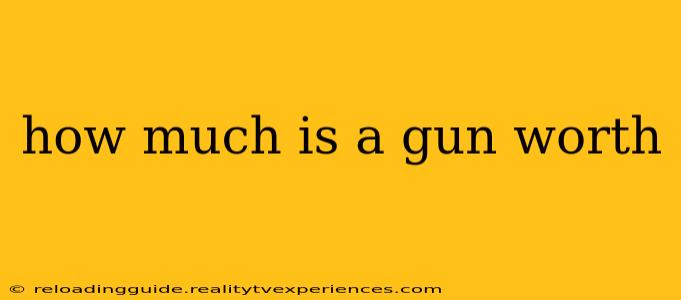Determining the value of a gun isn't a simple task. Unlike many commodities with standardized pricing, firearm value is influenced by a complex interplay of factors. This guide will break down the key elements that determine a firearm's worth, helping you understand how much your gun might be worth.
Key Factors Affecting Gun Value
Several crucial factors influence a firearm's market value. Understanding these will give you a much clearer picture of your gun's worth:
1. Make and Model:
The manufacturer and specific model are fundamental. A Colt Python will command a significantly higher price than a less-desirable brand. Rarity and desirability within a model line also play a role. For example, a limited-edition or commemorative model will usually be worth more.
2. Condition:
The condition of the firearm significantly impacts its value. This includes:
- Mechanical Condition: Is the gun fully functional? Are there any mechanical issues? A gun in perfect working order is worth far more than one requiring repairs.
- Cosmetic Condition: Scratches, dents, rust, and bluing wear all affect the value. A pristine, unfired gun will fetch a much higher price than a well-worn one. Original finishes are highly valued.
- Bore Condition: The condition of the gun's barrel is critical. A clean, rifled bore is essential for accuracy and impacts value significantly.
3. Accessories and Provenance:
Original accessories, like holsters, boxes, manuals, and cleaning kits, can substantially increase a firearm's value. A documented history or provenance—knowing the gun's previous owners or significant events in its history—can also add value for collectors.
4. Caliber and Gauge:
The caliber (for rifles and handguns) or gauge (for shotguns) influences value. Popular calibers and gauges tend to be more valuable. Less common calibers may hold value for specialized collectors.
5. Age and Historical Significance:
Older firearms, especially those with historical significance or association with famous figures or events, command higher prices. Antique firearms often appreciate in value over time.
6. Market Demand:
The current market demand for a specific make, model, and caliber plays a significant role. Factors like current events, legislation, and popular trends can influence demand and, consequently, value.
How to Determine Your Gun's Value
Several resources can assist in determining the value of your firearm:
- Online Gun Value Resources: Numerous websites provide firearm valuation tools, often requiring you to input the make, model, condition, and other relevant details. These tools can provide a reasonable estimate but shouldn't be considered definitive.
- Gun Auction Sites: Monitoring online gun auction sites can give you a sense of current market prices for similar firearms. Pay close attention to the final sale prices of comparable guns to get a realistic valuation.
- Licensed Gun Appraisers: For high-value firearms, consulting with a licensed gun appraiser is recommended. A professional appraiser can conduct a thorough inspection and provide a formal appraisal report, which is often required for insurance purposes.
- Local Gun Shops: Local gun shops are a valuable resource. They are familiar with the local market and can offer an opinion on your firearm's worth based on their experience.
Disclaimer: This information is for educational purposes only and does not constitute financial or legal advice. Always consult with a licensed professional for accurate valuation and legal guidance regarding firearms. The value of firearms can fluctuate significantly, and this guide provides only general guidelines. Always handle firearms safely and responsibly.

